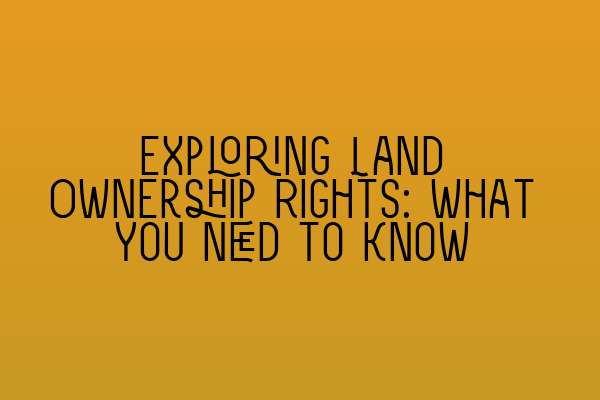Exploring Land Ownership Rights: What You Need to Know
Land ownership is a fundamental aspect of property law. Understanding your rights as a landowner is crucial, whether you are purchasing a new property, investing in real estate, or dealing with land-related legal matters. In this comprehensive guide, we will explore the various aspects of land ownership rights, providing you with the knowledge you need to navigate this complex area of law.
The Basics of Land Ownership
Before diving into the intricacies, let’s start with the basics. Land ownership grants certain rights and obligations to the landowner. These rights include the right to use, enjoy, and possess the land. As a landowner, you have the authority to build structures, cultivate the land, and even sell or transfer your ownership rights to others.
However, land ownership is not without limitations. Local zoning laws, land use regulations, and environmental restrictions can affect how you can use your land. It is essential to be aware of these limitations and ensure compliance with all relevant laws and regulations.
Types of Land Ownership
There are various types of land ownership, each with its own legal implications. Here are a few common types:
- Freehold: Freehold ownership grants the maximum control and rights over the land. As a freehold landowner, you have indefinite ownership and can use the land as you see fit, subject to any legal restrictions.
- Leasehold: Leasehold ownership gives you the right to use and possess the land for a specific period, typically through a lease agreement. While you do not own the land outright, you have certain rights and responsibilities during the lease term.
- Joint Ownership: Joint ownership occurs when two or more individuals share ownership rights in a property. This can occur as Joint Tenancy or Tenancy in Common, each having distinct implications regarding the transfer of ownership and survivorship.
Legal Challenges in Land Ownership
Legal challenges related to land ownership can arise in various situations and require careful consideration. Some common challenges include:
- Boundary Disputes: Conflicts over boundaries between neighboring properties can be complex and emotionally charged. Resolving boundary disputes often requires examining historical records, conducting surveys, and seeking legal advice.
- Easements and Rights of Way: Easements grant certain rights to individuals or entities to use another person’s land for a specific purpose. Understanding easements and rights of way is crucial to ensure that your land rights are protected and that you are not unlawfully restricting others.
- Adverse Possession: Adverse possession is a legal doctrine that allows a person to claim ownership of another’s land if they have openly, continuously, and exclusively possessed it for a specified period, usually several years. Understanding adverse possession laws is essential to protect your land from potential claims or to assert your rights as an adverse possessor.
For a more comprehensive guide on legal challenges in property transactions, check out our article:
Legal challenges in property transactions: A comprehensive guide.
Land Law and Mortgages
When it comes to property transactions, mortgages play a significant role. A mortgage allows individuals to secure a loan using their property as collateral. Understanding the relationship between land law and mortgages is essential for both borrowers and lenders.
For essential considerations when dealing with mortgages and land law, check out our article:
Mortgages and land law: Essential considerations for property transactions.
Environmental Ethics and Sustainability
Preserving the environment and balancing development with sustainability are crucial aspects of land ownership. Environmental ethics play a significant role in land use decisions and property development.
To explore the topic of environmental ethics in land law and find ways to strike a balance between development and sustainability, read our article:
Environmental Ethics in Land Law: Balancing Development and Sustainability.
Conclusion
Land ownership rights are essential to understand and navigate, whether you are a property owner or involved in property transactions. Knowing the basics of land ownership, the different types of ownership, and the potential legal challenges can help protect your rights and make informed decisions.
For additional guidance on dominating property law questions and avoiding common pitfalls, we recommend reading our article:
Dominate Property Law Questions: Avoiding Common Pitfalls.
Remember, land ownership is a complex area of law, and seeking legal advice from a qualified solicitor is always advisable when dealing with land-related matters. At SQE Property Law & Land Law, our expert solicitors are here to help you navigate the intricacies of land ownership and protect your interests.
